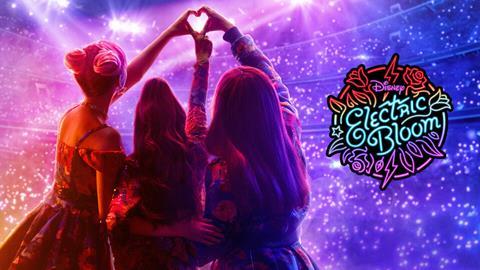Dawn Kay dives into the Disney world of Electric Bloom. With its themes of friendship, difference and identity, there are plenty of opportunities for faith conversations in the home

Electric Bloom is the latest musical drama series from Disney+, and it has already begun to capture the attention of its target audience of children, pre-teens, and families. The series premiered in the UK on 15th September 2025 with its first 13 episodes available to stream immediately. A further 4 episodes are scheduled to drop on 15th October, rounding out a compact but complete first season. What makes the show slightly different from earlier Disney teen dramas is the way the story is told. The three main characters are already famous when the series begins. Each episode unfolds as the girls look back on their early high school years and the very beginnings of their band’s formation, all framed through the concept of their fictional podcast, ‘Ask Us Anything’. This device gives the series both a nostalgic angle and a structured way to revisit the moments that shaped their friendship and careers.
At its core, Electric Bloom is unmistakably a Disney Channel-style teen musical drama. It uses the familiar format of brightly lit sets, laugh track humour, exaggerated characters, and fast-paced storylines that echo classics like Hannah Montana, Camp Rock, and Austin & Ally. Fans of those earlier shows will instantly recognise the rhythms and tropes such as awkward classroom moments, school hallway encounters, and plenty of big musical numbers. That being said, Electric Bloom does distinguish itself musically. Legendary songwriter Diane Warren, who has penned hits for artists like Aerosmith, Céline Dion, Cher, Whitney Houston, and Lady Gaga, is involved in the soundtrack. Her participation ensures that the songs carry an extra level of polish and memorability compared to many other youth-oriented series. While the dialogue and comedy lean towards light entertainment, the music provides a genuine emotional punch, with lyrics and melodies that could easily stand outside of the show itself.
Electric Bloom presents what I would call a very “Disney view” of high school. The challenges are real but softened, wrapped in bright colours, upbeat music, and neat resolutions
One of the strongest aspects of Electric Bloom is its exploration of friendship. Rather than simply showing three girls instantly bonding, the writers highlight the often messy, complicated nature of forming new connections. A particularly striking scene occurs in episode 2, when the characters reflect on how different they are and wonder if they can truly make a friendship work. In a moment of honesty, one girl admits that difference doesn’t have to be a barrier: “I like hanging out with people who are different than me. It is exciting and inspiring.” This scene captures an important truth for young viewers that friendships don’t always come from similarity. Sometimes the strongest relationships are built on contrast, on learning from someone with a different outlook or personality.
As a parent, this storyline resonates with me. My own children, particularly my daughter, found the transition around Year 9 challenging when it came to friendship groups. At 14 years old, students are navigating the pressures of new subjects, exams on the horizon and shifting peer dynamics. Many children struggle with finding a secure circle of friends and the sense of belonging that is so vital at this age. Seeing a show like Electric Bloom highlight that struggle, even in a lighthearted way, feels validating. It gently reassures young viewers that they are not alone in feeling uncertain about where they fit in.
older teens may find the show too simplistic. By the time viewers reach 15 or 16, they often want shows that mirror more of their real experiences, with storylines about stress, identity, mental health, or the pressures of exams. Electric Bloom isn’t that show
The series also touches on the universal dramas of high school life: homework deadlines, crushes on classmates, petty fallouts, and the desire to be seen as cool or popular. These themes are classic to the Disney brand; never too heavy, always played with humour and a quick resolution by the end of the episode. But beneath the colourful sets, there are glimpses of very real teenage pressures.
High school, whether in the USA or the UK, can be a confusing and emotionally turbulent time. Teenagers are trying to work out who they are and what they stand for. They want to be liked and accepted, yet fear standing out for the wrong reasons. This delicate balancing act is made even harder by the hormonal changes that fuel heightened emotions and self-consciousness. Add the intensity of social media and you have a snapshot of the challenges today’s teens face.
There are, of course, many Christian parallels that we, as parents, can naturally weave into conversations while watching Electric Bloom
However, Electric Bloom presents what I would call a very “Disney view” of high school. The challenges are real but softened, wrapped in bright colours, upbeat music, and neat resolutions. Harder issues such as bullying, mental health struggles, or deeper inequalities in education are largely absent. This is deliberate, of course. The series aims to be PG-rated feel-good entertainment rather than social realism. For some viewers, this will be exactly what they want. For others, particularly older teens or parents hoping for more depth, the lack of real-world grit may feel limiting.
Would Electric Bloom appeal to an audience? Absolutely. It is designed to. The show is easy to watch, its episodes are short and snappy, the characters are instantly recognisable archetypes, and the music is genuinely strong thanks to Diane Warren’s involvement. For pre-teens and early teens, the series provides a colourful, aspirational version of high school life. One filled with laughter, catchy songs, and friendships that survive misunderstandings. For parents, the PG rating offers reassurance that the content is safe and free of anything too challenging.
It may not break new ground in storytelling, but it does provide a safe, enjoyable space for pre-teens to see reflections of their own school struggles and friendship dynamics
That said, older teens may find the show too simplistic. By the time viewers reach 15 or 16, they often want shows that mirror more of their real experiences, with storylines about stress, identity, mental health, or the pressures of exams. Electric Bloom isn’t that show. Instead, it is best seen as a comforting, upbeat entry point for younger viewers just beginning to step into adolescence.
There are, of course, many Christian parallels that we, as parents, can naturally weave into conversations while watching Electric Bloom. The series can open the door to talking with our children about God’s view on friendship, the importance of finding our true identity in Christ and the reassurance of his plans and purposes for each of our lives. It can even provide an opportunity to reflect on a biblical perspective of fame and fortune, helping young people to think wisely about what lasting success really looks like in God’s eyes. And you never know what God might do with a programme like this. After watching The School of Rock, my own son was inspired to learn the guitar. God used that gift and his passion for the Gospel, and he is now a worship leader and Christian music evangelist reaching thousands of young people with the good news of salvation.
Read more:
Despite the dark exterior Wednesday has themes Christian parents should welcome and lean into with their families
Christian parents can use KPop Demon Hunters to explore the gospel
Electric Bloom delivers exactly what you would expect from a Disney+ teen musical drama. Light-hearted storylines, catchy songs, and plenty of school-based comedy. Its exploration of friendship, particularly the idea that differences can be a source of strength rather than weakness, is an important and positive message for young audiences. While it doesn’t tackle the harder realities of teenage life, it doesn’t set out to and that is part of its charm.
For parents and children looking for a wholesome, entertaining series with great music, Electric Bloom is an easy recommendation. It may not break new ground in storytelling, but it does provide a safe, enjoyable space for pre-teens to see reflections of their own school struggles and friendship dynamics, all wrapped in the sparkle of Disney production values.


































